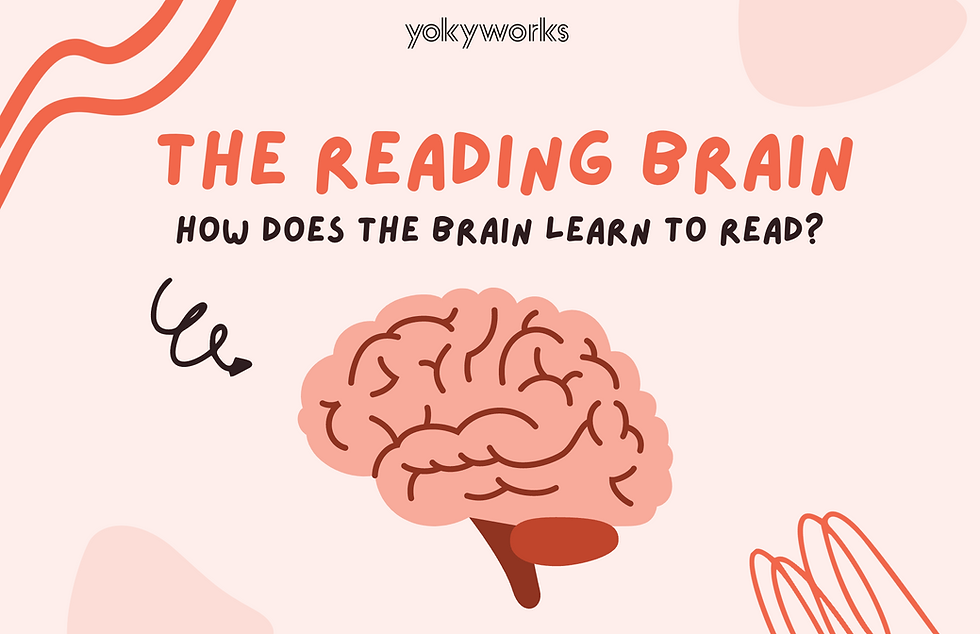The Science Behind Why Reading Fiction Helps Kids Develop Empathy
- Sarah@YokyWorks
- May 12, 2021
- 3 min read
Updated: Dec 14, 2022

In 2021, we probably don’t need to convince you that teaching empathy to kids is crucial for their development. At the same time, there’s still a lot of debate about the best ways to help kids develop this important skill set. As educational psychologist Michele Borba explores in her popular book, Unselfie: Why Empathetic Kids Succeed in Our All-About-Me World, empathy is “composed of teachable habits that can be developed, practiced and lived.” You likely already integrate some of her empathy building habits into your parenting, but did you know that there is a strong correlation between increased empathy and reading fiction?
Empathy and the reading process
Empathy is far more complex than just feeling compassion towards others. As professor Maryanne Wolf emphasizes in her book Reader Come Home: The Reading Brain in a Digital World, empathy “involves a whole feeling, thinking network that connects vision, language, and cognition with extensive subcortical networks.” When we train our brains to read closely and fully inhabit the story in front of us, written words activate a series of interconnected bodily responses, all of which make up the experience of empathy. A famous fMRI study, done by literature professor Natalie Philips and a team of Stanford neuroscientists, found that when reading closely expansive areas of the brain became activated, including the areas involved in motion and touch. If you’ve ever wondered why simply reading about another person’s experiences can make you cry, this study may provide some answers.
How reading can teach kids empathy
At YokyWorks, we love seeing that look of triumph on a students face when they first realize they have the tools to read written English. We also know that simply decoding words is unlikely to improve a child’s ability to understand the feelings and experiences of others. As Maryanne Wolf emphasizes, teaching empathy is specifically connected to developing “deep-reading processes” in the brain from a very young age. Deep reading involves making inferences and “perspective taking” while you read fiction. It means temporarily losing yourself inside the world created by a story and inhabiting the lives and feelings of others. Just as reading is not a natural process, deep reading behaviors take time to learn and to master. As Wolf notes, the perspective-taking element of deep reading requires developing the “cognitive patience” to enter others’ thoughts without the visual and auditory stimuli that movies and film can provide. Though many children aren’t taught to closely engage with what they read until high school or even college, building this skill set in elementary school can help your child develop the neural connections necessary to inhabit more complex ideas and perspectives as they grow.
How adults can help kids become empathetic readers.
Reading to teach empathy starts with removing distractions so that your child can focus on the story in front of them. But, it is also crucial for them to become emotionally engaged with the characters. As this 2013 study on empathic responses to reading fiction articulates, “it is not the activity of reading itself that transforms the self, but the emotional involvement in a narrative." One of the best times to help your child develop their ability to empathize with characters is when reading together. You can activate deep reading processes in your child by pausing the story and asking them questions about characters’ actions and emotions. When you come across sentences that resonate with you, point them out to your child and see if they share your emotional response. Inviting them to share the parts of a story that resonate with them is also a great way to help them process what they are reading. Just remember that it may take time for you to notice a change in your child’s ability to connect emotionally. Even if your child seems at first unable to relate, don’t be surprised if they develop empathy for a character weeks, months or even years later!




Comments